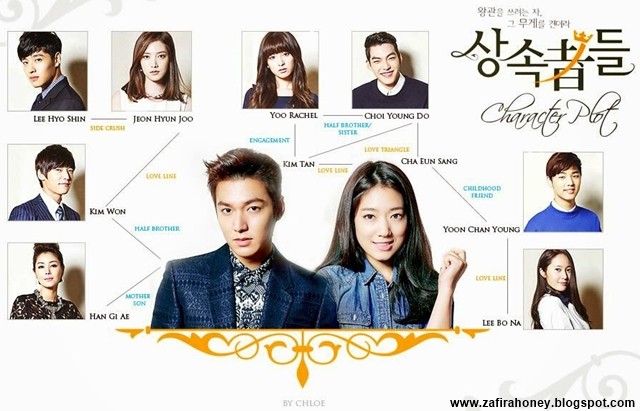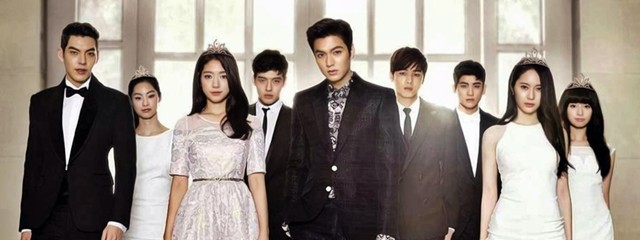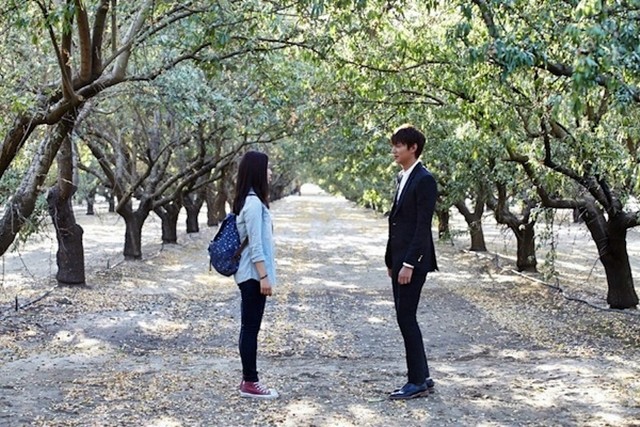By Jae-Ha Kim
Substack
November 13, 2016
☆☆☆☆
Kim Tan (played by Lee Min-Ho)
Cha Eun-Sang (played by Park Shin-Hye)
Choi Young-Do (played by Kim Woo-Bin)
I tend to pick the best K-Dramas when I’m sick. Last winter, I got hooked on “Oh My Venus.” This past week, after I watched about all I could stomach of the presidential election coverage and its aftermath, I binge-watched “The Heirs.”
I liked almost everything about this 20-part Korean series, from the acting, to the writing, to the pace. The chemistry between the primary cast members Lee Min-Ho, Park Shin-Hye and Kim Woo-Bin was outstanding — though of the three, only Park would pass believably as a 17 year old.
Before going further, here’s a character map via zafirahoney.blogspot.com to help keep track of who’s who:

Set in a high school populated with the children of the rich — and therefore — powerful, “The Heirs” introduces us to teenagers who live by a strict caste system. The son of Korea’s most powerful man, Tan is at the top, followed by his frenemy Young-Do. Students hailing from new money families are regarded as gauche, but tolerated. The scholarship students who have to work after school are at the bottom. They are bullied and beaten mercilessly — and even those who’d like to help won’t, because they don’t want to align themselves with the unwanted.
In a school filled with state-of-the-art security cameras, the series makes it clear that the administrators also turn a blind eye and only intervene when members of the elite fight each other. The scenes that were most difficult for me to watch were when Young-Do and his cronies singled out a scholarship student to humiliate and beat him until he finally transferred out. Though the series does an admirable job of having Young-Do mature by the series finale, it was difficult for me to warm up to him because of his cruel past.
Tan, who was sent away to study in America for three years before returning to Korea, used to be as bad as Young-Do. But since his shameful actions were never shown, he’s already set up as the character the writers want viewers to root for. The thing is, Kim Woo-Bin is an actor so full of charisma that he can make a seemingly unredeemable character like Young-Do likeable.

I can’t think of any Korean Drama I’ve watched yet where there isn’t a love triangle, and this is no exception. I supppose there is realism in how both boys treated Eun-Sang, the daughter of a mute maid who has to work multiple jobs, even with her scholarship. Though they both profess to care for her — and even love her — they treat her like property that must be taken away from the other. To have her is to win.
Though she tries to maintain her dignity, Eun-Sang is like a human rag doll who is literally pulled and pushed around at the whim of the boys who want to protect her. It didn’t matter whether she liked either one of them. Neither would take no for an answer, and that’s a scary reality for her.
As attractive as Eun-Sang is to those two boys, she is in danger of becoming a target at school if the other students learn of her status as the daughter of the maid who serves Tan’s family. Tan tries to keep it a secret. But, before long, the kids at school are gossiping about what horrible background she might come from: an adopted child with no blood ties to a protector? The product of an affair? The child of a servant? Or, worst of all, hailing from an impoverished family.
For a little while, only Tan knows that she is poor and living (with her mother) in a small closet-sized room in his mansion. And Eun-Sang keeps his secret, that he is the illegitimate child of his father’s mistress.
Tan clearly was starved for love growing up. His father never showed him affection, because he didn’t want to make Won — Tan’s older brother — jealous. Won was so worried about Tan eventually taking over his role as the prodigal son that he refused to bond with his little sibling. Ironically, the brothers both fell in love with poor women who their father didn’t approve of. Won’s girlfriend was an orphan, who was able to finish college due to a scholarship from his father. Though beautiful, kind and smart, she was considered an unsuitable match, due to her lineage.

Abuse:
Young-Do’s father is cold, distant and shows zero affection for his only child. He slaps his son’s face in public and shows no mercy when the two spar in judo. When Young-Do and Tan get in trouble at school for fighting, Young-Do begs Tan to tell his father that he hit Tan first. He knows he will get in trouble not for being in a fight, but for losing.
In a lighter scene, when it’s revealed that Tan finished last in his class of 100, and Young-Do placed 98th, his father smiles and says, “You’ve finally beaten Tan at something.”
Favorites:
I loved the warm relationship between Eun-Sang’s childhood friend, Chan-Young, and his father. I also enjoyed the scenes between Eun-Sang’s mute mother and Tan’s mom, who was kept hidden from “respectable” society due to her mistress status.
욕/Swearing:
When I was little, many of my friends were fascinated that I could speak another language besides English. They were curious if I could, you know, swear in Korean. I could not. I came to the U.S. before I started kindergarten and my parents never cursed, so where would I learn to swear?
But, thanks to Korean dramas, I’m learning all kinds of yok now. Here are some of my favorite Korean swear words.
You’re welcome!
꺼져 (guh jyuh): You’ll hear this phrase the most. It’s a rude way to say, get lost.
미친놈 (me chin nom): Crazy bastard.
새끼 (saekki): The literal meaning is young/little animal and is also often used fondly to refer to one’s own children. But, said in an angry tone, it’s a derogatory way to put down a person.
개새끼 (geh saekki): 개 means dog in Korean. This phrase basically means son of a bitch.
Airdates:
Twenty episodes aired from October 9 to December 12, 2013, on SBS.
Spoiler alert:
In the final episodes, loose ends are tied up. Young-Do is reunited with the mother who he thought abandoned him as a child. Her disappearance was never explained, but it’s likely that she was running away from an abusive marriage, where her control-freak husband flaunted his affairs.
Tan’s father survives his operation and seems to relent on Tan’s relationship with Eun-Sang. Tan’s relationship with his brother warms up as well. And it appears that Tan and Young-Do won’t allow bullying at their school anymore. At least, that was my hope.
© 2016 Jae-Ha Kim | All Rights Reserved

I had korean international students in my classes in the usa who would swear in korean thinking I wouldn’t understand them. They quickly learned that i knew most of the negative korean words since I had guy friends when I lived in korea. The cursing stopped in my classes with them. Funny thing was that then the Vietnamese and Chinese students wanted to learn the korean swear words too. Haha When my dh gets upset with the kids, sometimes he goes off on them in korean. They are clueless as to the meaning of some of the words at this point but they do know it means that they need to change their behavior quickly.
Rocking.
Whereas my mom taught me some, except I didn’t know how bad they were until I said them in front of some Korean friends. ? My mom taught me what??! ??